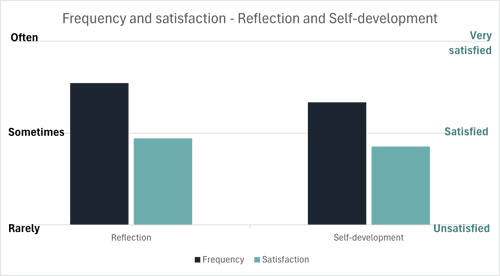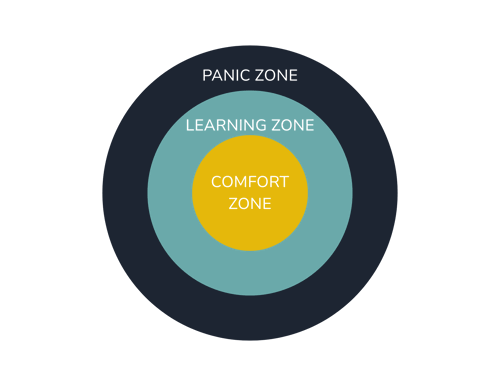Future Fit leaders dare to look in the mirror. They understand their strengths and they acknowledge their blind spots. It’s precisely where it gets uncomfortable that we learn and grow the most, both as leaders and as people.
Our recent survey of over 300 executives and non-executives shows that almost every leader dedicates time to reflection and personal development. Yet one in four respondents remains dissatisfied with both the frequency and quality of their efforts. In this article, we share the key statistics, insights and lessons from our research, alongside practical tools to help you reflect and develop, especially when it feels “lonely at the top.”
From time spent to time well spent
According to our findings, most leaders reflect regularly and invest between half an hour and two hours each week in their development. Personal growth is clearly valued. Yet a significant number still feel it isn’t enough (see Figure 1).
The barrier is rarely actual time constraints. More often, it’s a matter of priorities, day-to-day pressures or balancing work and home life. Other obstacles include limited budgets, lack of structure, choice overload and uncertainty about the calibre of coaches or programmes.
These data tell us that even those who carve out time aren’t always happy with the outcomes. Moving from “investing time” to “using time effectively” proves far less straightforward than many expect, but it’s essential for future-ready leadership.

From intent to impact
Practical hurdles aside, the way leaders learn also makes a material difference. Learning without clear intent or structure is a missed opportunity.
Research shows that intentional learning - with defined goals and a structured approach - yields significantly better results. This is especially true when the emphasis is on adaptable competencies, behaviours, knowledge and skills, rather than on fixed personality traits. Other recent studies confirm that a targeted focus produces demonstrably stronger development outcomes. By applying clear intentions and a framework, you can make your learning objectives more concrete and pursue them more effectively.
Our advice: As a Future-Fit leader, adopt a structured, goal-oriented approach that suits your personal learning style. You’ll not only make better use of your time but also achieve genuine progress.
Each year I take a course that pushes me out of my comfort zone.
From comfort zone to learning zone
Despite the fact that nearly everyone in our survey reports investing in reflection and development, we observe in practice that leaders seldom pause long enough to engage in true self-examination. Reflection alone won’t take you out of your comfort zone into the learning zone.

Research shows that external guidance is key to arriving at structured insights and actions. What do all external support methods have in common? They provide an impartial mirror, someone who challenges you without agenda or bias, asking questions you wouldn’t think to ask yourself.
Almost half of our respondents say they welcome development through coaching or peer-review groups, yet many lack that critical sparring partner. Hierarchical relationships often inhibit candid feedback, even though that openness drives growth. Time and again, leaders tell us how valuable and enlightening a deep-dive reflection with an external expert can be.
Our advice: Find someone who will give you honest feedback and help you uncover your blind spots, especially where it’s uncomfortable. Seek out challenges and push yourself into your learning zone.
Five lessons for impactful leadership
What do these insights mean for you as a Future Fit leader? Five priorities stand out:
- Make reflection and development non-negotiable. Set aside a regular, “sacred” slot that matches your learning style and preferences.
- Prioritise quality over quantity. Approach your development time with clear intent and structure: define your goal and measure outcome, not just hours spent.
- Focus on developable competencies. Invest time in areas where your efforts will yield the greatest return.
- Embrace the learning zone. Choose development activities designed to stretch you beyond your comfort zone.
- Engage a trusted partner. Enlist someone who provides unvarnished feedback and helps illuminate your blind spots.
Looking in the mirror together
At Odgers, we’re acting on these survey results to enhance how we support Future Fit leaders through coaching, assessments, masterclasses and peer-review.
Ready to take an honest look in the mirror? Get in touch with us. Together, we’ll see clearly - openly, independently and without judgment.

Never miss an issue
Subscribe to our global magazine to hear our latest insights, opinions and featured articles.
Follow us
Join us on our social media channels and see how we're addressing today's biggest issues.



